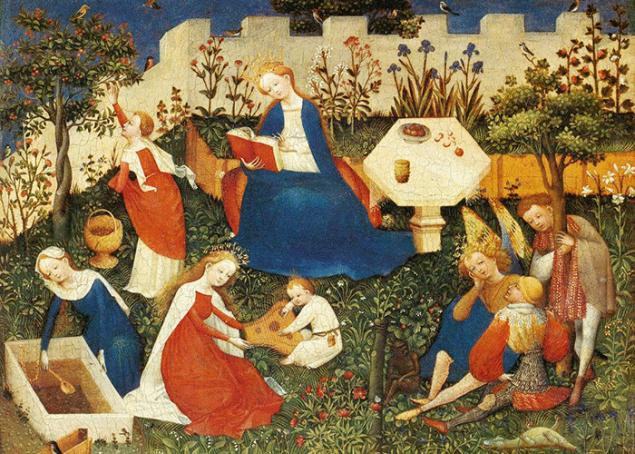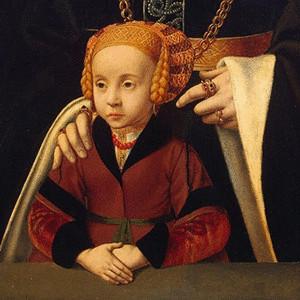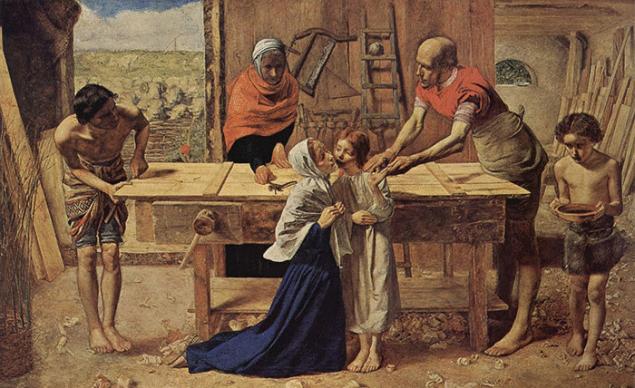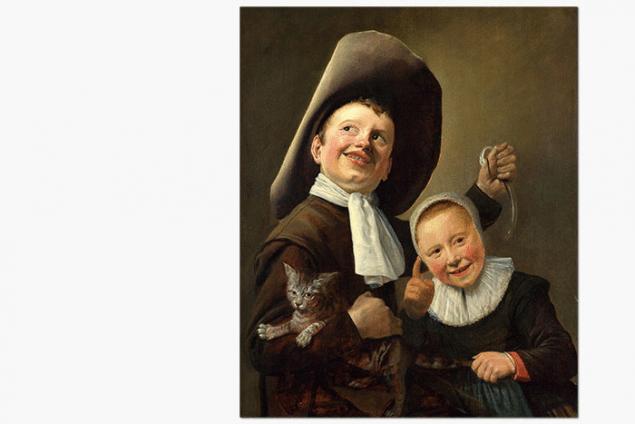597
Education of the senses: the teenagers of the middle Ages differ from today's youth

There is a perception that parents raise their children with an iron fist in the East, but just a few centuries ago special ferocity in the upbringing of the younger generations differed exactly Northern Europe. For example, was a common custom to send children away to a strange house where they lived and worked there. Translation of the article the BBC Magazine that was the way the system of education of children in Northern Europe in the Middle ages and in modern times.
Around 1500, the assistant to the Venetian Ambassador to England was struck by the strange attitude of the British to parental responsibilities, which he learned during his travels. He wrote to his superiors in Venice that the English raised their children in their own homes to 7, at the latest 9 years, and then gave everyone, both boys and girls, to hard service in the houses, anchoring them, so to a new place years seven to nine. The unfortunate children were sent away from home regardless of class: without exception, no matter how rich they were, had to send their children to other people's houses and in exchange to take in your own home someone else's children. Assistant to the Ambassador explained that all this is done for the good of themselves as children, but he suspected that the British prefer to keep away from strangers, because they can be fed and more to get to work.
These observations shed light on how was the way the system of education of children in Northern Europe in the Middle ages and in modern times. The majority of parents of all class facilities sent their children to work as servants and apprentices, and only a small minority sent them to study in a Seminary or University. However, the children were not so young, as evidenced by the Venetian author. According to the research of Barbara Hanawalt from Ohio State University, among the aristocracy there were times when the younger generation was sent away from home at the age of seven, but most parents still felt it necessary to say goodbye to their children at the age of fourteen years.

Samples of letters and diaries in medieval schoolbooks indicate that leaving home was a real injury. "All the pleasures I knew as a child from three to ten years, while he was under the tutelage of my mother, my father, replaced by anguish and pain," complains one boy in the letter that students had to translate into Latin. Uneducated servants had no opportunity to communicate with parents, and difficulties with movement in those days meant that even if the children have been found 20 miles (35 kilometers) from the father's house, they felt completely isolated.
So why this, at first glance, the brutal system were developed? For the poor in this practice was an obvious benefit: they could get rid of excess boarder. However, parents sincerely believed that referring the children and help them: because it was the best internship. Such training usually lasted about seven years, although it happened that and ten. The longer was the period — the cheaper the training itself, which confirms the opinion of the Venice traveler: children really was in those days of cheap labor. In 1350, the year the Black Death reduced the population of Europe almost by half, so that civilian labor was very expensive. On the other hand, a decrease in the population meant that cheaper food, so work with accommodation at the place of work was the most practical.
"It was believed that the parents got something to teach, but you will certainly more if you get experience, learning from someone else," says Jeremy Goldberg from the University of York. Perhaps it was both a way for parents to get rid of uncontrollable teenagers. According to research by social historian Shulamith Shahar, it was believed that strangers were easier to raise a child — and that idea divided even the population of individual regions of Italy. In the fourteenth century Florentine merchant Paolo of Certaldo advised: "If you have a son who's no good to anyone, give it to the merchant, so that sent him to a far country. Or did you send it to one of his close friends... Nothing to do. While your son stays with you, he will find a use in life."

Many Teens contract was ordered to behave. In 1396, a contract between a young apprentice Thomas and caster of copper from Northampton by the name of John Hindle was witnessed by the mayor. Handle, assumed the formal duties of guardian and promised to supply the Thomas food, teach him his craft and not too severely punished for mistakes. In turn, Thomas pledged not to leave the workplace without permission, not to steal, not to gamble, not to go to prostitutes and not to marry. If Thomas violated the contract, the length of his internship was to be doubled, and he had to take the place of an apprentice 14 years.
Ten years of abstinence was too much time for most young people, and apprentices earned a bad reputation for constant entry to drinking establishments and lewd behavior. So, Perkin, the main character coursage "the Story of a cook," was evicted by the owner of the house for stealing, and settled in a new place with a friend and a prostitute. In 1517 Marselska Guild complained that many of their apprentices "terribly humiliated himself," spending money from their employers to "... besputin, whiskey, cards and other wasteful fun".

In some areas of Germany, Switzerland and Scandinavia some level of sexual contact between a man and a woman in their late Teens were allowed. Although the traditions known as "laying" and "night courtship", has been described only in the XIX century, historians believe that these rituals are from the Middle ages. "The girl stays at home, and the man visits her, — says Colin Heywood from the University of Nottingham. — Is he allowed to spend the night. It can even lie with her in bed. But they are not allowed to remove her clothes. So they are not very much you can afford — just a little innocent foreplay". In other embodiments, the same tradition demanded of men that he slept on a blanket when she slept under the covers, or on the other side of the wooden Board that was placed between the young. It is not anticipated that a similar ritual will necessarily lead to engagement or marriage.
To some extent young themselves controlled their sexuality. "If the girl started to count too available, she always left some nasty sign near the house, so the whole village knew about her bad reputation," says Haywood. Young people also expressed their opinions about the morality and behavior of adults in rituals known as "Shareware" or "shameful songs". If society didn't approve of the wedding — for example, because the husband beat his wife or was whipped or there was inequality of age, the couple could publicly embarrass. A crowd of young people surrounded the newlyweds: they were carrying dolls representing their victims, beating pots and pans, Toot horns and even possibly pinched the fur of cats, to they shouted (in French, a", Charivari" — caterwauling, as the ritual was called in the German tradition — Katzenmusik).
In France, Germany and Switzerland young people United in the youth gang "abbayes de jeunesse", which every year were chosen "King of Youth". "They were in the forefront when there is events like the carnival, and the whole world had turned on its head", says Haywood. It is not surprising that sometimes their actions are out of control. Philippe Ari describes the case when in Avignon, a group of young people literally occupied the city during the carnival and demanded a ransom for his release, because without the ransom they had "the right to give a thrashing to any Jew and any streetwalker".
In London, the different guilds divided into smaller groups and began to engage in brutal feuds. In 1339 between the fishmongers and zlatokuznechny there was some major fighting. The irony was that the most bad reputation in terms of cruelty, were the trainees of the legal professions. These boys from the bench had access to independent financial means and have not lived under the auspices of their teachers. In XV-XVI centuries of unrest among the London apprentices became more frequent and began to choose their victims foreigners — especially Flemish — and usurers. The first of may, 1517 on the streets was thrown cry: "Disciples — to the clubs!" and this was followed by a night of violence and looting, the scope of which shook Tudor England.
"The fact that this time the city was crowded with apprentices and adult population found that controlling the youth is becoming increasingly difficult," says Barbara Hanawalt. Because early death from infections began to occur less frequently, students are faced with the need unusually long wait before the case learn from their mentors. "And now, you have a number of young people who have no chance to acquire their own workplace and their own business, — says Jeremy Goldberg. — That is, you have a number of frustrated and disenfranchised young people, who are prone to challenge authorities, as they have nothing to lose."
How young men and women of the Middle ages was different from today's youth? It is difficult to judge on the basis of the information we have, — said Goldberg.

However, many parents of teenagers of the XXI century according to will begin to nod their heads, recognizing their children in the students of St. Bede the Venerable eighth century CE that were "skinny (though eating at your pleasure), swift, straightforward, irritable and active." Modern parents can even cry over a rare collection of letters of the XVI century, written by family members Behaim of Nuremberg and saved Stefan Omentum.
Michael Beheim was sent for education to the Milanese merchant at the age of twelve. In the 1520's, he complained in his letters to his mother that he don't teach anything related to trade and market, and are forced instead to scrub floors. However, a greater concern parents should have called their son described the fear of catching the plague.
Another son Bekimov in the end of XVI century wrote to her parents from school. Fourteen-year-old Friedrich complained about the food, asked to be sent some things to make it look no worse than their comrades, and asked, who will now wash his clothes. His mother sent him three shirts in a bag with a warning that "they may be a bit wet, so hang them for a while by the window". Wanting to provide and give reasonable advice, like any modern mom, she has added: "And then put this bag of dirty clothes before washing".published
P. S. And remember, only by changing their consumption — together we change the world! ©
Source: theoryandpractice.ru























